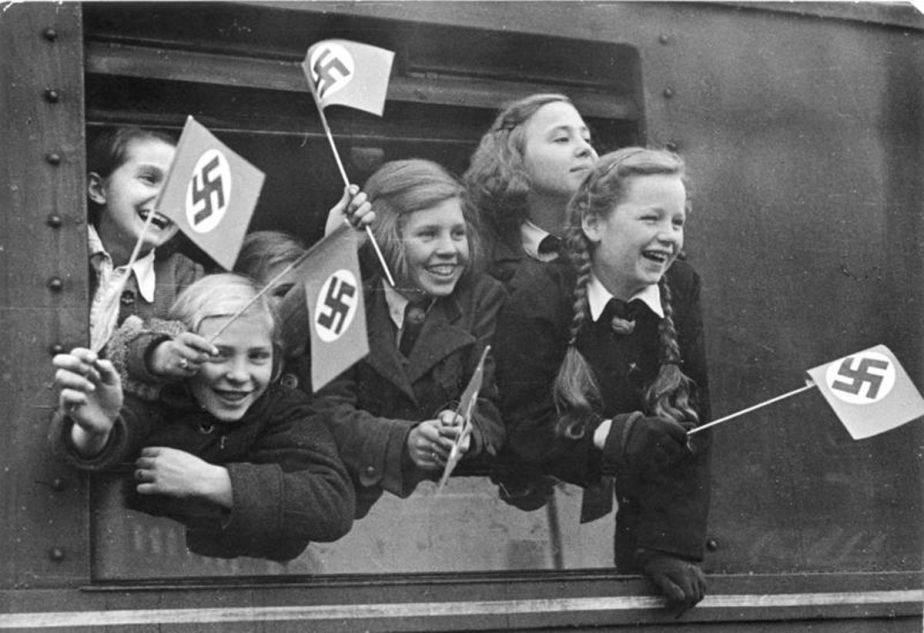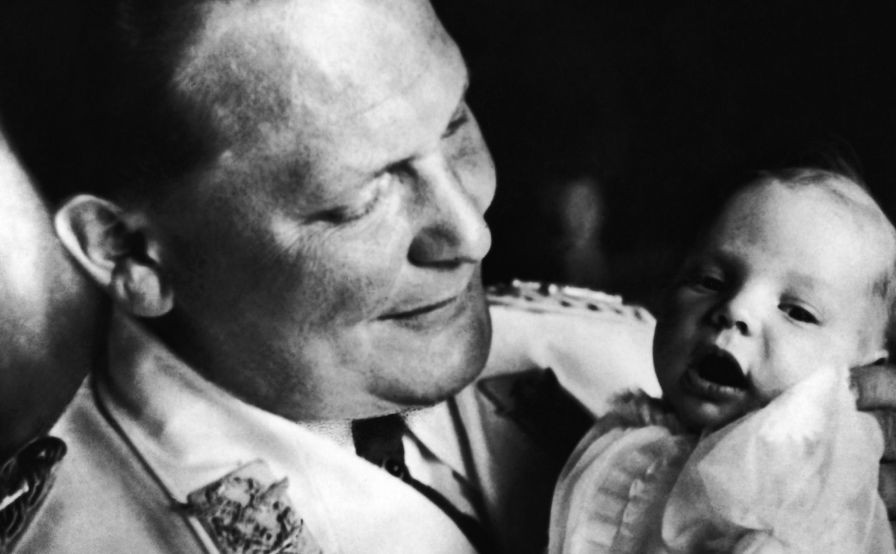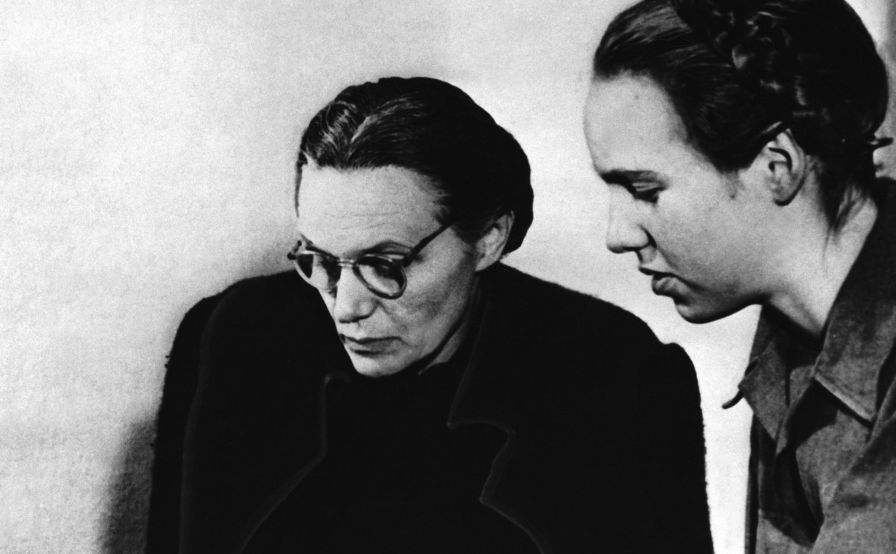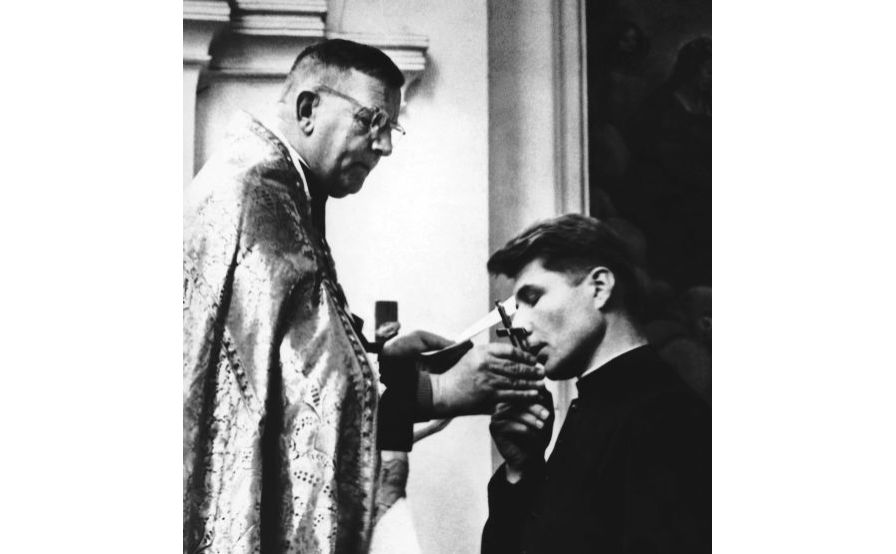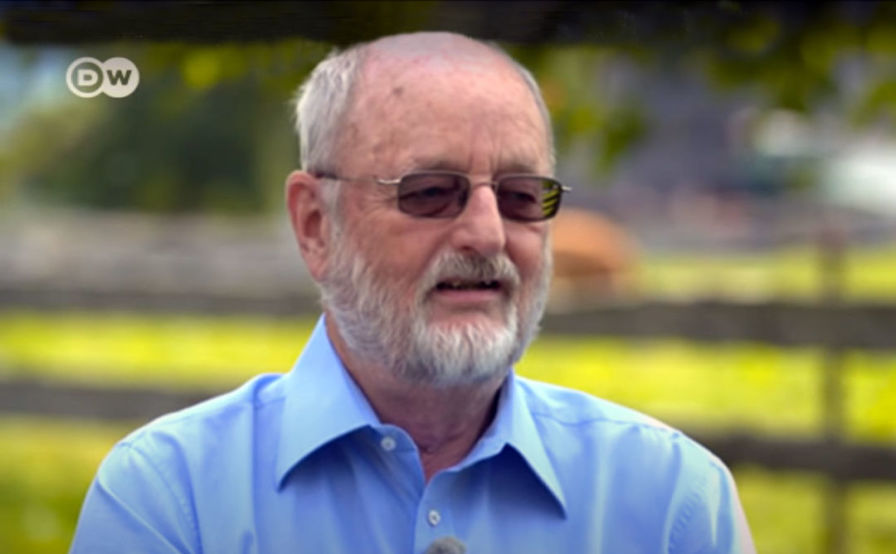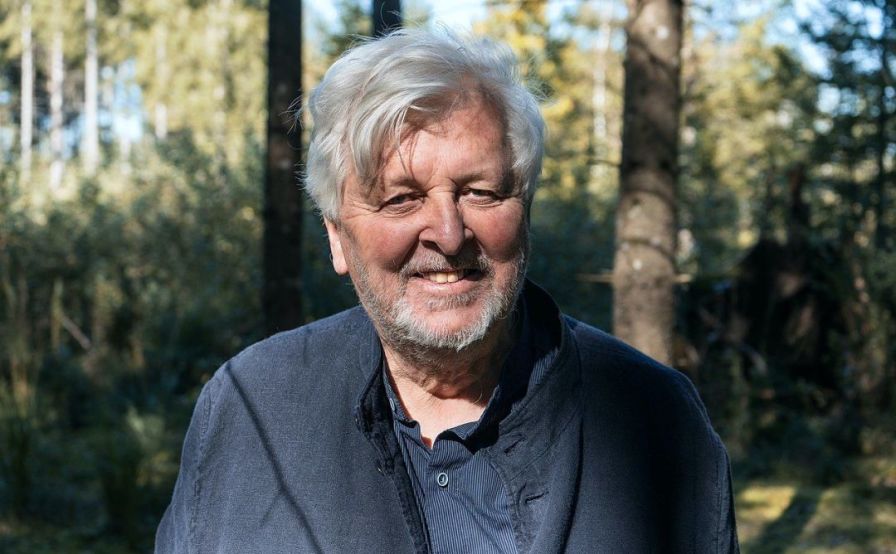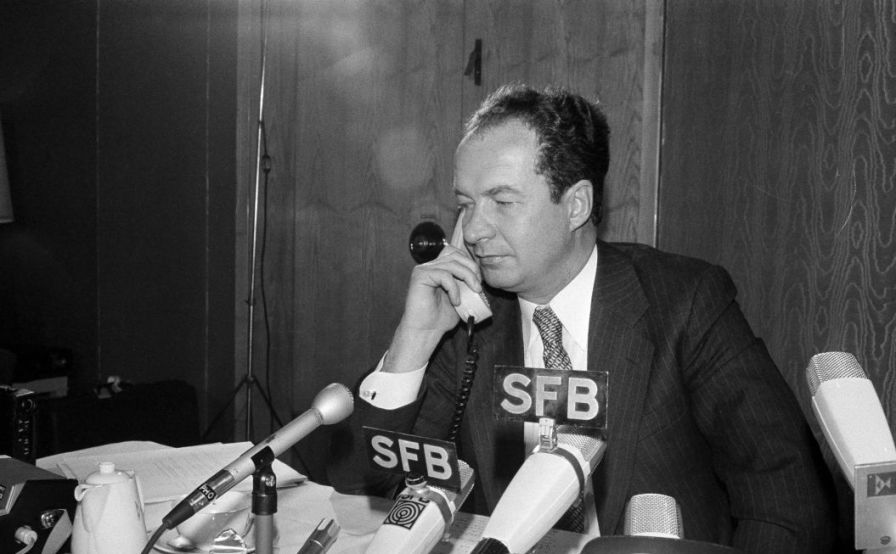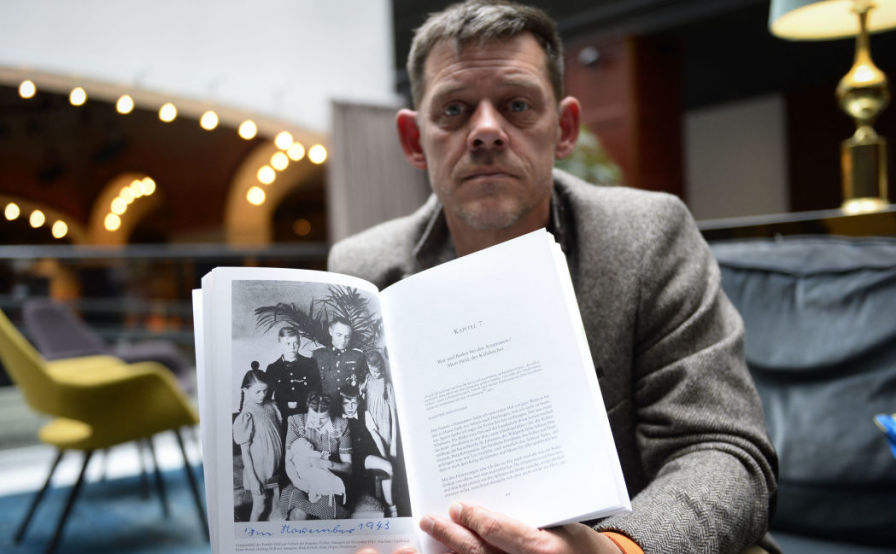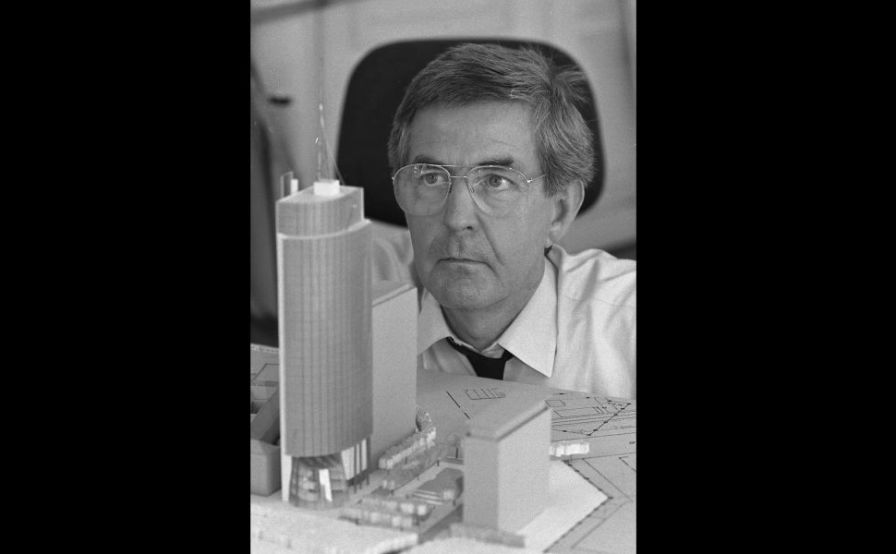Fatherland, in German ‘Vaterland', is the land of ancestors. The leaders of the Third Reich expected to leave their children a rich legacy: a prosperous empire, ancestral estates, wealth and family names inspiring reverence. But they left them a scorched desert, poverty, shame, and dreadful surnames. Sons, daughters, and grandchildren had to spend their lives trying to figure out how to dispose of this inheritance. And how to treat their parents - to live in their shadow or to step out of it.
One of the prerequisites for the title of a true Aryan and the right to stand at the helm of the Third Reich was the characteristic of a "great family man". All influential Nazis showed the public a glossy picture of their lives – strong marriages, faithful wives, and angelic children who absorbed the Führer's great ideas with their mother's milk. A separate propaganda staple – and a very effective one – were the frequent publication of photographs or images in newsreels showing Hitler's closest associates surrounded by model families and admiring the rising generation – touching, chubby toddlers and thoughtful, charming teenagers, the future elite.
It would not be long before these photographs and newsreels stunned viewers with their inglorious end and the shameful lives of each and every one of the top criminals. People would ask again and again how high-ranking Nazis could keep an indestructible wall between two areas of their lives, how they managed to be bloody and inhumane executioners in one case and tender fathers in the other, who pampered their children and taught them to distinguish between right and wrong?
Other questions inevitably followed earlier ones. What then happened to the children of the "bigwigs" of the Third Reich? What did they become? How did they build their own lives? How did they react to learning about their fathers? Did they feel guilty and responsible for being their descendants?
For years, journalists and writers have literally hunted down the descendants of the Nazi top brass, but very few have agreed to open the door just a little bit into their lives. Some changed their names and tried to cover their tracks. Some decided to live their own lives, separating themselves from the deeds of their fathers, and "just not think about it". Some continued to idolise their parents and either refused to believe in their crimes, believing them to be victims of a conspiracy, or shared their beliefs. Others chose the path of reconciliation and tried to love with open eyes, no matter what and not forgetting anything, in the spirit of "yes, he did a lot of unforgivable outrageous evil, but he was a great father". There were others – those who were shaken to their core by the revelations about the true nature of fathers, and who renounced them and devoted their lives to exposure and repentance.
They were interviewed, articles and books were written about them, and documentaries were made. And some of them have written books themselves in the hope of explaining themselves, directly addressing either the world or their parents who have already passed away.
Carriage Turns Into Pumpkin
Childhood, the early memories of the children of high-ranking Nazis are just like any other. Wealth, luxury, endless possibilities, endless pampering, and a sense of a perfectly rightly ordered world.
Little Niklas Frank, son of the "Butcher of Poland", master of the General Government of occupied Poland, remembered forever several palaces that became the family domain – through their corridors he rode in his toy car, deliberately crashing into servants forced to tolerate the behaviour, and demanded elderly servants go up and down long staircases for the fun of it. And in a luxury train car, he and his mother travelled from Poland to Germany and back: mother took out all the new and looted goods.
Little Edda Göring was spoiled by the whole country, led by parents who adored their late only daughter, and in early childhood, she became the owner of a sizable collection of fine arts and jewellery.
Little Adolf Martin Bormann was nicknamed "Krönzi", short for Kronprinz (German for crown prince) when he was a child.
Little Richard von Schirach thought his parents and grandfather were deities: Grandpa Heinrich was the Führer's personal friend and photographer, his mother was practically the Führer's ward, and his father was the man who made the Hitler Youth the dream of every German child and who now reigned in beautiful Vienna.
Little Gudrun Himmler, called "Püppi" by her father, was literally carried in the arms of all of her father's friends and comrades, and the opportunity to go to work with him was a joy for her: beautifully ordered "camp towns", polite people in striped pyjamas, exhibitions of drawings by prisoners who became good under her father's strict but kind supervision.
The little offspring of Rudolf Höss lived literally across the gate from the main camp of Auschwitz. They had many amazing toys made by the prisoners, including a large wooden aeroplane. A most comfortable house equipped with the latest technology, a swimming pool and a beautiful garden, where they played and picked strawberries themselves (only their mother, who called this place "heaven on earth", told them to wash them very carefully because they always smelled a bit burnt and sometimes had flakes of soot on them).
Everyone remembers that time as a lost paradise. All the fathers worked very, very hard and, of course, it was their hard, selfless work for the benefit of the fatherland that earned them such a wonderful life and a nice house. All children were brought up like hereditary princes - with manners, health, reading and music, surrounded by nannies, governesses and private tutors, and educated in the best schools. But some of the mischiefs were half-heartedly overlooked. And little Niklas Frank never got an earful for impolitely sticking his tongue out the window of a luxury car at some nasty, dirty, skinny ragamuffin kids as he drove past - his mother had taken the little one "for shopping" in the Krakow Ghetto. But how much fun it was when father's subordinates, for his amusement, would put some skinny, bad "Untermensch" on a donkey's back, and the donkey would jump up and down and throw another one down in the dust and he couldn't move, and then they would drag another one up, and everyone would laugh and drink cocoa afterwards. True, his older brother Norman was playing football one day in the streets of Warsaw and saw several people shot in the vicinity. At dinner, he dared to ask dad what it meant, but father threw down his fork, and shouted, "I don't want to hear about it!" and left the table.
They all had something to lose. Countless estates, luxury houses, furniture, art, jewellery, money, cars, yachts, fancy clothes, home menageries and cinemas, gardens, free servants, and social entertainment. Status. And, most importantly, an image of themselves.
By the end of the war, there were no more illusions - their families moved further and further to the home front, their mothers carried bags full of jewellery, their older brothers were killed at the front or taken prisoner, and then the impossible happened: Nazi Germany capitulated and that was the end of their childhood.
Expulsion From Paradise
All of the fathers tried to escape. Some died in the process - Gudrun Himmler's father managed to crack an ampoule of poison during a British doctor's examination. Some went missing - no one knew where Adolf Martin Bormann's father had gone. Some were "taken" very brutally – for the first time in their lives, the father of five Höss children and the father of Niklas Frank experienced being beaten on their own skin. Some of the fathers surrendered in an attempt to retain their dignity - Edda Göring's father went up to the enemy and identified himself. Many of them left their families those very small ampoules for emergencies. But none of the wives ever dared to kill the children. Only the parents of the six little Goebbels, each with a name beginning with an "H" after Hitler, were the only ones who blithely destroyed their offspring before committing suicide.
Some mothers were also sent to camps - and the four von Schirachs were left all alone, while Adolf Martin Bormann became an orphan because his mother died of cancer in a prison hospital. After his school was closed in April 1945, he lived for a while with a farmer's family on false papers, converted to Catholicism, and was arrested by American intelligence right in the middle of a service he attended as an altar boy.
The younger Schirachs ended up being taken somewhere in the countryside, where they literally wandered around, looking for food in the forests and fields and wearing cleats made from car tyres. Many children ended up in boarding schools. Some were lucky enough to be reunited with their mothers - they even had something to eat, because enterprising mothers sold the jewellery and belongings of Jews murdered by their fathers. Some were taken in by grandparents, often staunch Nazis.
Then it became permissible to visit their fathers in prison. It was a truly traumatic experience for each of the children - because their fathers were definitely imprisoned in that horrible place completely unjustly. Six-year-old Niklas Frank saw his father for the last time when everyone already knew that he was going to be hanged, and he could not understand why he had lied when he said that they would be spending the upcoming Christmas together. And Richard von Schirach was destined to visit his father for the next twenty years - once a year, for thirty minutes a visit. He prepared for each meeting by writing down questions, and not once in all those years did his father ask him anything of himself, mostly recommending another opera to listen to.
Most at least learned poverty, and sometimes even misery first hand. And almost everyone faced the consequence of their lineage: while not long ago their surnames had opened all doors, now the doors were slammed in front of those surnames.
Genie Out of the Bottle
The truth about their fathers was not immediately apparent. It was no secret to some - Rudolf Höss' children knew who he was and what he did (albeit not completely), and fully supported their father - that is how they understood loyalty.
Others found it easier. Manfred Rommel, the son of Hitler's favourite commander nicknamed the "Desert Fox", lost his illusions about the Führer personally and Nazism in general when his father was assassinated. Following an assassination attempt in 1944, Hitler believed that Erwin Rommel was at least aware of the conspirators' plans - although he was recovering at home from serious wounds. In front of Manfred, high-ranking officers came to the house and took his father away. Rommel whispered to his son in farewell that there was a condition: either he committed suicide or his whole family would suffer. The elder Rommel took the poison and was buried with honours - the whole of Germany was plunged into mourning: according to the official version, the famous field marshal's heart failed. Six months later, 15-year-old Manfred deserted from the front without any feelings of guilt.
Berthold Maria Schenk Graf von Stauffenberg had it even easier. His father, who had carried out the assassination attempt on the Führer, was a hero in the eyes of the children. His mother explained that his father Claus had done it for Germany and to end the war. The children were never ashamed of his name, except that it annoyed them later that the Scientologist and commoner Tom Cruise played the Catholic aristocrat.
Monika Hertwig, the daughter of concentration camp commandant Amon Göth, had it much worse. As a child, she seriously believed that her father and the Jewish prisoners at the Plaszow Camp lived as one big family. As a teenager, she was proud of her parents: they lived in a beautiful house, purchased from a Jewish woman they had helped escape and flee abroad. The execution of her father seemed a monumental injustice to her. The first doubts she experienced as a teenager was when rumours began to trickle in that her father had somehow been involved in the killings. When asked exactly how many people he might have killed, her mother vaguely told Monika "several", and then she stopped asking. The older she grew, the more she wanted to know the truth. She found out, for example, that her childhood home was obtained through blackmail: Amon had forced the landlady to sell it at a bargain price, promising her immunity for the next year and the chance to leave. Two weeks after the sale, the woman was taken to a camp and executed. Then Monika had a shocking experience: she saw a number on the arm of a fellow bartender in a cafe she occasionally visited. By a terrible coincidence, it turned out to be from Plaszów. Not yet aware of what her father was doing there, Monika said her last name, and the individual's reaction was terrifying. Gradually everything was revealed to her: that Amon had killed at least 500 people with his own hands and that one of his favourite pastimes in the morning was to shoot prisoners from the balcony.
"Especially to shoot women with small children because it was interesting to see if you could kill two people with one bullet".
When Steven Spielberg's "Schindler's List" came out, Monika decided she had to see it. Her husband refused to accompany her to the cinema, so she drove to a neighbouring town on her own. After seeing the film, in which Ralph Fiennes portrayed her father, she became physically ill.
The younger Bormann uncovered the truth gradually. In 1943, he asked his father how he would explain National Socialism in simple terms. He replied simply, "Fulfilment of the Führer's wishes". Adolf Martin was a convinced young Nazi and even studied at the Advanced School of the NSDAP in the Tyrol. After the collapse of the Reich and his father's disappearance, he gave up the name "Adolf", but still believed that Bormann was innocent. The turning point stemmed from photographs of Bergen-Belsen - the ovens, the children's corpses. When the younger Martin found out that all this was proved to have been done on his father's orders, he finally decided to become a priest (The elder Martin did not believe in God and hated religion).
Still I Will Not Leave Him, Because He is Good
The children of the Third Reich, who grew up and then became adults, mostly followed the family commandment – honour thy father. As a result, they chose to either turn a blind eye to the obvious, to regard their fathers as blasphemous martyrs or victims of criminal orders, or to accept their rightness, infallibility, and impartiality. It was easiest for those who had grown up safely in Latin America, under the wings of those fathers that managed to successfully escape. It was more difficult for those who stayed in Germany.
For example, both Klaus von Schirach and Edda Göring flatly refused to talk about their fathers for decades. Gudrun Himmler essentially became queen of a secret Nazi organisation and a staunch successor to her father's cause, while Wolf Rüdiger Hess spent a lifetime rehabilitating the name of the perpetual Spandau prisoner, to the detriment of his work and his own family.
Rudolf von Ribbentrop, who had fought quite selflessly, who had received five wounds at the front and several decorations, who knew much from his father and had seen some of the decisive events with his own eyes, was convinced to the end of his life that his father had been unjustly executed. Eventually, he even wrote a book "My Father Joachim von Ribbentrop: Never against Russia!" dedicated to an examination of the foreign policy of the Third Reich and the contribution of the head of the Nazi Foreign Ministry.
Rolf Mengele, son of the notorious sadist known as the "Angel of Death", who experimented on Auschwitz prisoners, knew very well where his father was hiding. Josef Mengele was wanted by intelligence agencies around the world, primarily Mossad. While his father openly spurned his son, and after he fled to Brazil he divorced his mother and married his brother's widow, and although Rolf knew all about his crimes, he never found the strength to turn him in. He regarded this as "betraying the family". Rolf became a lawyer and maintained a relationship with his father, who made no secret of having no remorse. His son remained loyal even after his death. An elaborate reconnaissance operation by Israeli agents, who followed the younger Mengele relentlessly, led to a shocking discovery: the killer doctor, whose had become a household name, had been dead for four years. After this, his son began to repent and apologise to the Jewish people.
The entire second generation of Hösses shared the beliefs of the monstrous Commandant of Auschwitz and deeply honoured his memory. It was not easy for them after the war - they lived in abject poverty until eldest son Klaus found a job. Years later, in the 1980s, he, an alcoholic beggar, would die in Australia. Inge-Brigitt Höss also emigrated. For a long time, she kept it a secret from everyone whose daughter she was. She worked as a model in Spain, moved with her husband to the US, and there took a job in a beauty salon owned by a Jewish woman. Eventually, she confessed who she was but was not fired, and Inge-Brigitt worked there for 35 years. Her children and grandchildren do not speak German and do not know about Rudolf Höss. She is now dying of cancer. Her older sister Heidetraut Höss, whose exact whereabouts in Germany are unknown, is also terminally ill. Her younger sister Annegret is in hiding from everyone and her younger son Hans Jürgen has joined the Jehovah's Witnesses and cut all ties with the family, no one knows whether he is alive or not.
The members of the Quandt family flatly refused to make any public statements. Meanwhile, they were the extremely fortunate direct descendants of Magda Goebbels, a branch spawned by her son from her first marriage. Harald Quandt enjoyed extensive help from his stepfather Josef Goebbels, and the stepson did not fail, becoming a convinced Nazi. He served in the Luftwaffe, was a prisoner of war under the Allies, and on his return, he received a fabulous inheritance from his father - an entire industrial empire that made him the richest citizen in Germany. More than 200 companies: textile and pharmaceutical factories, car plants, a large share in BMW… Harald had five daughters, whose fortunes have grown to this day. Neither their father, who died in a car crash in 1967, nor they have ever given an interview about the Goebbels. One of Harald's daughters, Colleen-Bettina, converted to Judaism and married a Jew, and her son, Magda Goebbels' grandson Haim, lives in Israel and serves in the army.
Fight the Dementor
Acknowledging the guilt of their fathers and coming out of their shadows had a curious feature. The second generation - sons and daughters proper - overwhelmingly preferred to remain silent. The grandchildren felt a little more freedom but faced the unanimous condemnation of the clan in the event of renouncing a brave grandfather. In any case, the rare renegades who dared to publicly condemn a Nazi ancestor were never understood within the family.
Nicklas Frank had the hardest fate - his family felt no shame for his father, the "Butcher of Poland". He tried to share all his terrible discoveries about Hans Frank with his sisters and brothers, but they did not want to know. His book of revelations was received with great sorrow. The shadow of his father buried everyone. Brigitte, convinced from her youth that she would die at her father's age, took her own life at the age of 46. Sigrid immigrated to South America and died when she reached her mother's age, and she never fully forgave her younger brother for airing the family's dirty laundry in public, though their contact was cut short after a brief phone conversation in which his sister made a cynical joke about not believing in the Holocaust. Their younger brother Michael drank himself to death in 1990. Life was more difficult for their elder brother Norman, who continued to love his father. He was aware that Hans Frank was a criminal, had seen all the evidence, but was unable to accept that he was guilty and that his execution was lawful. Nevertheless, Norman believed that a son of a war criminal should not have children – and he didn't. Another ordeal befell him. His wife had committed suicide, unable to bear the presence of an eternal third wheel in this marriage - the hanged father-in-law: Norman thought of his father constantly and closed himself off in these thoughts. After his wife's death, he tried to take his own life. Eventually, he died in a deplorable state, utterly deranged.
The six children of Albert Speer, the chief architect of the Third Reich and Reich Minister for Armaments and War Production, for the most part, tried to refrain from speaking in public and generally kept a low profile. In response to any questions, they simply referred to their father's memoirs and diary. They did not have to endure much harassment, and the family name did not arouse much antipathy in anyone. It may have been because of the phenomenal charm of Hitler's pet, who had once conquered Nazi Germany, or because his impressive architectural legacy had survived, or because at the Nuremberg trials he had used a brilliant, cunning strategy to avoid all responsibility. Whatever the case, the Speer children never had trouble finding work. And while Albert Jr. became an architect, continuing the dynasty, his sister Hilde, a publisher and sociologist, eventually chose political activity - helping the victims of anti-Semitism under the Nazi regime. Hilde's son, Moritz Schramm, lives in Denmark, is married to a Danish woman, and raising a son with whom he speaks Danish, and works as a professor at the University of Southern Denmark, studying German and Danish literature. He adored his grandfather but he does not refuse to think about his bad past. And in the end, has chosen a curious strategy: to act differently in his career than Albert Speer would have done, so as not to become a hostage to the pernicious family vanity. Where his grandfather would have jumped at the opportunity, his grandson consciously takes a step back and has already turned down a promotion several times. Nevertheless, Moritz, his mother, and uncle do not socialise with other members of the family - there were those among them who preferred to make Albert look like an innocent martyr.
Amon Göth‘s daughter, Monika, has found the strength to sever all emotional ties with her hanged maniac father. She told the truth about him in documentary films, she gave interviews, and wrote a book "I Have to Love My Father, Don't I?" By then her mother, unable to bear the truth about her adored husband, had committed suicide in the late 1980s. Monika went against her father and his representations in her personal life as well: in 1969, she had a brief affair with a Nigerian student, with whom she had a daughter. The girl was given up for adoption, but the connection with her was not severed, and it was not until she was twenty years old that a grown-up Jennifer Teege met her mother for the first time. She learned the truth about her Nazi ancestor in a biographical book about Monika. In 2013, the mixed-race woman, daughter of a Nigerian man, wrote a book "My Grandfather Would Have Shot Me: A Black Woman Discovers Her Family's Nazi Past".
The daughter of Waffen-SS General Karl Wolff, Himmler's closest ally, cancelled out her father's beliefs with her life. Born Helga, she became known as Fatima Grimm as one of Germany's first Muslim converts. She was first married to a Czech Muslim Orientalist, then to a German. She edited and chaired two Islamic journals and translated the Quran into German, with commentaries, in five volumes. Fatima went through a period of persecution: some did not want to communicate with her because of her father, others because of her husbands and new faith. Among the latter was Gudrun Burwitz (née Himmler), who at once broke off a close friendship from her childhood years.
Göring's relatives built their lives very differently, perhaps because they were not his direct descendants, but because they bore a name hated by the whole world. His niece Elisabeth had it easier, for she had reason to be proud: her father, Herman's brother Albert, had saved several dozen Jews during the war. Elisabeth, who looks very much like her uncle, is quite fond of Hermann Göring, although she does not deny his crimes. In any case, she has lived all her conscious life in Lima, Peru, has been married to a Peruvian, has raised two sons and works as a promoter of the youngest, an opera singer. On several occasions in her life, by the way, she, a translator, did not get the job when her family connections were found out. Elisabeth always takes money for interviews about her uncle.
On the other hand, another indirect relative, Bettina, Göring's grandniece, spent her life trying to get rid of her anguish. And, like her brother, she deliberately doomed herself to infertility so as not to continue her lineage - she was sterilised at the age of 30. She also destroyed all the family photos of Hermann Göring. She had to break away from the family quite early: this branch of the Göring family remained loyal to the ideals of Nazism to the end. Bettina had been a communist, a hippie, a healer (and once lost a Jewish client because of her surname), and lived for many years in Mexico, in Santa Fe, as far away from civilisation as possible.
It was not easy for Himmler's grandniece Katrin either. She has not spoken German abroad since her student days and was ashamed of her surname. Then she married an Israeli Jew. Her husband's family accepted her and their relationship lasted even after the divorce; her relationship to the main organiser of the massacres did not prevent this. Her own family, on the other hand, has been estranged from her since she wrote the book "The Himmler Brothers: A German Family History".
Rainer, the grandson of Rudolf Höss, made the most powerful breakthrough. He became famous as a principled judge of his grandfather, broke away from his family, repented at Auschwitz, wrote a book, and was even persecuted by neo-Nazis who would not forgive him for refusing to become the new "Führer". At least that is what he says himself. Except that the plausibility of his stories has lost all credibility since it was discovered that he was involved in a series of fraudulent schemes and was using his family history for this purpose.
To learn more about the most striking descendants of the Nazi criminals, see the photo gallery.
Edda Göring. The Recluse.
(1938 - 2018)
The daughter of Reichsmarschall Hermann Göring and his second wife, a second-rate actress, Emmy Sonnemann, was a long-awaited child. Edda's birth was a miracle for her parents, who were in their 40s. The second most powerful figure in the Nazi Party was rumoured to be sterile as a consequence of a wound received during the Beer Hall Putsch, and the girl was said to have been "created in a test tube", or conceived by someone in the inner circle of Hermann Göring (from 1940 to 1946, the rumours were spread in Nuremberg by Julius Streicher, whom Göring tried to get revenge on for the rest of his life). Edda's birth was made, without exaggeration, a national holiday - Göring received congratulations from all over the world (over 628,000 in total). The finest works of art, including two canvases by Lucas Cranach the Elder, were among the gifts for the newborn. Hitler was chosen as the godfather and all the leading magazines covered the christening. At Himmler's urging, Emmy Göring and Edda's nanny, who had not previously been in the party, were immediately accepted into the NSDAP (Hitler awarded Emmy the Golden Party Badge, usually given to the founders of the party or for outstanding achievements for the party). The Nazi princess, (that's what she was nicknamed) adored by her father, grew up in the luxurious Carinhall residence, she was given anything she wanted. At the age of three, she received a small copy of the Sanssouci Palace (50 m by 7 m and 3.5 m high) as a gift from the Luftwaffe command. There was a popular joke in Germany: "The main autobahn was blocked because little Edda is learning to walk!"
After the surrender of Germany, Edda and her mother were interned in a camp and released in 1946. They were given the right to return to one of their houses near Nuremberg (they subsequently settled in Etzelwang). During the trial, the girl was allowed to visit her father. Those who knew her at the time noted both her very attractive appearance and her excellent upbringing and education.
Edda was famous for her beauty. She was severely traumatised by the suicide of her beloved father. She emphasised that Göring was a wonderful father, and she was ready to remember him only from this perspective.
Every door was shut in her face due to her surname, but still, she did not become an outcast. She eventually became a civil servant, graduated from the University of Munich, and then worked in a medical laboratory and planned to graduate as a medical technician. She became an employee of a rehabilitation clinic in Wiesbaden and cared for Emmy, who died in 1973.
In the late 1970s, she began a five-year affair with a journalist from the magazine "Stern", who dedicated a book to her father and bought his yacht, which was often visited by former Nazis, such as generals Wolff and Mohnke. Edda had no hobbies, never got married, and never had children.
In the last years of her life, Edda became a complete recluse, cutting all her ties with the outside world. She led a quiet and modest life in Munich. She lived in a small apartment. She kept a giant portrait of Hermann Göring in full uniform. She constantly sued for compensation for her confiscated inheritance or to keep the works of art appropriated by her father. The trial for the "Virgin and Child Under an Apple Tree" by Lucas Cranach lasted 15 years and only ended in 1968 with the victory of the city of Köln. On the other hand, Edda managed to get 150,000 German marks worth of jewellery back from the Bavarian government. Years later she managed to return a box with a photograph of her father that Edda had made as a baby and gave to her father in Nuremberg. She bought it at an auction at an exorbitant price (the box was probably stolen after Göring's death by some enterprising security guard).
She got tired of being responsible for the deeds of the late Reichsmarschall and eventually refused to communicate, not only with journalists, but also with her relatives, and isolated herself from the world. She remained a loving daughter, honouring the memory of her father and who thought it impossible to condemn or even discuss his crimes. Göring's only daughter was buried in secret, and her death was reported only three months after the fact.
Gudrun Burwitz-Himmler. The Heiress.
(1929 - 2018)
The eldest daughter of the most terrible man in the Reich (who was the only legitimate child of Heinrich Himmler: his son Helge and his daughter Nanette were born out of wedlock by his secretary; they later changed their surname and disappeared) worshipped her father. As a child, Gudrun saw her father's work in a distorted and beautiful way. A famous quote was found in her childhood diary: "Today we went to Dachau. We saw a lot of interesting things: great gardens with lots of pear trees. There were also pictures drawn by prisoners. Amazing work! And then we had lunch. It was very delicious".
After the war, Gudrun and her mother Margaret found themselves in a church orphanage. She was called as a witness at the Nuremberg Tribunal, but then Himmler's daughter went on a hunger strike in protest. She never believed that her father could commit suicide, and claimed that he was killed by the British. Due to her surname, Gudrun could not find a job, tried to become either a dressmaker or a bookbinder, she moved frequently and eventually came under the influence of her father's former companions: they were the only people who helped the young girl in difficult times. Heinrich Himmler remained an icon for his daughter, the same as Hitler. She saw the Third Reich as a paradise, SS men as heroes and Nazism as a religion. Gudrun Himmler, not surprisingly, eventually became the queen of a secret world that brought old Nazi fanatics and neo-Nazis together. Since 1951, Gudrun Burwitz had been dedicated to the secret organisation "Silent help", which provided all possible assistance to Nazis - collected money and parcels for them, helped to transport them to safe places, and protected from retribution.
In 1952 she took part in the creation of the youth organisation "Wiking-Jugend" (which was only banned in Germany in 1994), inspired by the Hitler-Jugend. Only after Gudrun's death, did it become known that she worked in the German Federal Intelligence Service from 1961 to 1963 under former Wehrmacht General Reinhard Gehlen, formally as a secretary and under an assumed name. Naturally, Himmler's heiress became a staunch denier of the Holocaust and the results of the Nuremberg trials.
Her husband Wulf Dieter Burwitz was cut from the same cloth – he was a convinced neo-Nazi, journalist, and one of the "deniers". They had two children. The vast majority of war criminals and accomplices to the massacres that Gudrun helped (such as Klaus Barbier and Adolf Eichmann) escaped justice. For a very long time, the true character of the Gudrun's organisation was kept secret, and even at the end of the 20th century the organisation was not taxed and enjoyed the support of the state.
In her old age, Gudrun became one of the icons, guru, and leader of a powerful secret international neo-Nazi network. She was nicknamed the "Nazi Mother Teresa". During the rallies, she was the one both old and young Nazis did the Hitler salute to. In 2002, journalists Andrea Röpke and Oliver Schröm were able to infiltrate the network after long and thorough preparations. The collected material shocked the whole world. After their articles and the book "Silent Help" were published, the organisation went underground, and the journalists became personal enemies of Gudrun (since then, they and their loved ones have not felt safe, constantly receiving threats).
Martin Bormann Jr. The Priest.
(1930 - 2013)
The eldest of the ten children of the Führer's personal secretary and head of the chancellery was named Adolf Martin. As expected, as a child and as a teenager, he was an exemplary little Nazi. Everything was over as soon as the Reich collapsed, and his mighty father ran off and disappeared. A year later, the son of Martin Bormann had already been through a lot: he learned from the newspaper about his mother's death from cancer in prison, lived under a false name in a village, converted to Catholicism and became an altar boy, was arrested and when released returned to his parish. His subsequent life was associated with religion: being shocked by his father's crimes, Martin Bormann decided to atone for his sins and pray for his countless victims. After becoming a priest, he found all his brothers and sisters and then went to the Congo as a missionary. Later, he fled from there due to tribal uprisings, but then returned and stayed for another year. Among the people confessed by Bormann was a former Wehrmacht soldier who killed a six-year-old girl with a bayonet on the order of the commander. During the next 25 years, the man could not see other children and did not have his own, and in confession, he said that he hoped to burn in hell and hanged himself a week later. During the Congo Civil War, Martin Bormann was held hostage, rebels beat him with whips and tortured him. He survived 14 km of running barefoot on stones and three days of sitting in a swamp up to his neck; he was kidnapped for ransom twice. Martin Bormann told himself that he was being punished for his father's sins, and he was ready to die quietly.
In 1969, Martin, who was almost fatally wounded in the Congo, was saved by a nun. As a result, two years later both left the order and married, but did not have children. Bormann studied and taught theology, travelled to various countries, repented for his father's sins and spoke about the crimes of the Third Reich. He also visited Israel and Russia.
In 2011, Martin Bormann Jr. was accused of paedophilia. A former student of the Catholic seminary where Martin Bormann worked in the early 1960s stated that he had been raped by him when he was 12. Other former students of Bormann also complained of physical and sexual abuse. By then, Bormann had already been diagnosed with dementia and did not respond. However, a commission by the Catholic Church of Austria requested that he pay compensation.
Niklas Frank. The Exposer.
(1939)
The youngest of the five children of the Führer's former personal lawyer, the "King of Poland", and the head of the General Government, spent his childhood in Kraków. It was clear to Niklas that there was no love between his parents and they were cheating on each other, and he knew that by sending Hitler a touching family photograph of the children, his mother was not letting his father get a divorce. Soon Niklas realised that his parents did not love their own children either. He studied literature and history, became a journalist and made a great career – he worked at German "Playboy" for three years, and then at the prestigious magazine "Stern", managing the department of culture and worked as an interviewer (he interviewed Lech Walesa for instance). In the meantime, he led a major investigation into his life, finding out details about his father's crimes, against the will of his family, who, with the exception of Niklas' older brother Norman, eventually abandoned him. Finally, when Niklas Frank was almost 50 years old, he published his book "In the Shadow of the Reich", the first of its kind, a very coarse and straightforward exposure of Hans Frank. Consequently, a huge scandal broke out, resulting in years of harassment for Niklas. By the way, his older brother Norman, who did not approve of the book, wrote a letter in his brother's defence to "Stern". The children of other Nazis, one by one, stated that they would not shake his hand. They could not forgive Niklas for his frankness. They called him a traitor, claiming that he had broken the taboo. However, he did not stop there - he wrote a play "the Father", which was staged in Vienna; the rotten corpse of Hans Frank was exhumed during the performance to punish him once again. Later, Niklas wrote an equally scandalous book "My German Mother", and completed the series with a book called "Brother Norman", which was very different from the other books: here he spoke about discussions with his beloved older brother and about the difference in their perception of their childhood in occupied Poland as well as about the essence of a son's love. Eventually, everyone close to Niklas Frank died. He devoted his life to the revelation of his father's crimes, constantly reminding people of his guilt – he gave lectures, met schoolchildren, participated in documentaries. Niklas Frank was a happy family man - he had his beloved wife and daughter and three grandchildren. He always has their photographs with him as well as another photograph - a post-mortem photograph of his hanged father.
Richard von Schirach. The Abandoned One.
(1942)
The younger son of the head of the Hitler-Jugend and then the Gauleiter of Vienna enjoyed a happy childhood for a short time: after the war, the family fell apart. HIs paternal grandparents remained in Weimar, in the Russian occupation zone; his mother and her father were taken for interrogations. Henriette von Schirach was arrested three times and released on probation in 1947. She, her brother, Heinrich Hoffmann (Richard's grandfather, who was a friend and Hitler's personal photographer), were not given custody of the four children. The children were first sent to a tiny Bavarian village, left to their own devices, and then ended up in a state boarding school. Richard deliberately did not change his surname - because it was all he had left, and the family of von Schirach had existed for 700 years, he could not let the Nazi Baldur destroy it. A few years later, Henriette wrote to her husband that she was divorcing him and even published a hypocritical letter (she subsequently wrote a book in which she tried to clear and separate herself from her husband). In 1952 Baldur inherited a huge fortune from his American relatives. Henriette asked him for money for their children's education, but her ex-husband refused as the children made no complaints about anything, and he was sure she would spend it all on herself. However, he refused even his daughter Angelica. The only thing he talked about with his children who visited him in prison was art. Richard looked forward to his father's release and was very disappointed when he realised that his father was not interested in his children at all. Their relations deteriorated fast, and later Baldur von Schirach moved to his former adjutant, and then to a tiny town where he met an old homemaker.
Richard was never able to understand or forgive his father, whose love he wanted so badly. On the other hand, from then on there was no need to turn a blind eye to his guilt. Richard was shocked when he knew that his very cultured parent, a fan of literature and classical music, bragged about the extermination of Jews in Vienna. Afterwards, as a protest, Richard read only books written by Jewish writers banned in the Reich.
Richard von Schirach became a sinologist, received his doctorate in Chinese literature, and translated the autobiography of the Chinese Emperor Puyi. Then he wrote a book called "The Shadow of My Father" about Baldur and his life. After its release, he participated in the Russian documentary "Children of the Third Reich", but in the future, he tried to distance himself from the reflection on his parents. Several years later, he wrote another book "The Night of Physicists" about the German atomic project and even presented it in Russia. His children became writers as well. His son changed his surname, as he did not want to be associated with his grandfather. He lives in Barcelona and has visited Auschwitz.
Wolf Rüdiger Hess. The Protector.
(1937 - 2001)
The only child of Deputy Führer Rudolf Hess and Ilse Hess was the godson of Adolf Hitler. Actually, he was named "Wolf" after the Führer's nickname that he had been given as a teenager. When he was born, all of the gauleiters sent a handful of land from their fiefdoms to emphasise the significance of the event for the entire Third Reich.
After the arrest of his parents (Ilse was imprisoned in a camp from June 1947 to March 1948) Wolf's aunt took care of him. He chose to be an architect. But the true calling that Wolf Hess dedicated his entire life to was his father's rehabilitation. He even created the public organisation "Freedom for Hess", which included about 500 people.
In 1987, after the death of Rudolf Hess in the Spandau prison, the organisation was renamed "The Rudolf Hess Society". Wolf claimed that Ml6 agents had actually killed his father to prevent the truth about his mysterious flight to England from being revealed. Despite the official version of suicide, he obtained an independent examination, which proved that Hess had been strangled. After that, Wolf Hess filed a lawsuit against the United Kingdom Ministry of Defence (since the death occurred while British soldiers were on duty). He collected documents and testimonies, lost himself in archives, begged politicians and influential citizens of different countries for help, insisting that Hess must be released, as it is foolish to maintain a huge prison for one prisoner. Moreover, it was important to expose the English secret service! Naturally, Wolf Hess denied all the irrefutable facts, stated that the evidence presented at the Nuremberg trial had been fabricated, claimed that the gas chambers and the number of deaths at the hands of the Nazis were a myth, and firmly believed that the prisoners of the camps received a decent salary for community service and were not entitled to complain. Wolf wrote and published several books about Rudolf, denying the guilt of his father and presenting him as an innocent and decent man who sought world peace. He had three children, and his wife headed "The Rudolf Hess Society" after his death - he died after several heart surgeries.
Rainer Höss. The Professional Grandson.
(1965)
The grandson of the Commandant of Auschwitz had no idea as a child what his grandfather was like. His father, Hans-Jürgen Höss, made this topic a taboo for his family members. Nevertheless, when Rainer Höss was 12, he learned everything at school. The atmosphere in the family was extremely rigid and cold. Eventually, Rainer's mother divorced his father, and Rainer ended up in a boarding school - his father forgave neither his interest in the Holocaust nor his friendship with the children of a Jewish family living next door. At the boarding school, he first suffered from his family name - he was punished more severely than others, and Rainer didn't know why until one of the teachers explained.
Subsequently, he began to look for any information about Rudolf Höss, spent a lot of time in German archives, enlisted the support of the Institute of Modern History, and finally, he got access to his grandfather's safe, which contained photographs of the idyllic life of his family in close proximity to crematoriums and gas chambers. Rainer Höss contacted victims and survivors of the Holocaust and visited Auschwitz, the scene of his grandfather's crimes and the criminal indifference of his family. He visited Auschwitz several times, communicating with visitors. After participating in several documentary films, Rainer became particularly popular, he appeared on talk shows, gave interviews, tattooed the Star of David on his chest and the words "never forget", published his book "The Legacy of the Commandant", he sympathised with former prisoners and their descendants, but soon he went into hiding. According to him, representatives of a large network of neo-Nazis asked him to become the "new Führer", and after his refusal, they started hounding him. However, according to another version, things were far less complex: he started hiding because he was accused of various schemes.
Since 1991, Höss has been tried at least 18 times for fraud, forgery of documents, and use of violence (he spent a year and a half in prison for making serious threats). The last sentence was imposed on 24 June 2020. Ironically, in 2009 Rainer was exposed by Israeli journalist Eldad Beck, who accompanied him on his first two trips to Auschwitz (Beck's entire family was destroyed in the camp). The journalist reported that Rainer Höss is a pathological liar, adventurer, and an experienced manipulator who profits from his family property and the theme of the Holocaust, beginning with the first attempt to sell the family archives to the Yad Vashem Museum and ending with 17,000 euros obtained by fraud from an 80-year-old Bavarian to finish a non-existent film about the Holocaust. It turned out that Rainer's debts are worth 200,000 euros. In the summer of 2020, Israel and Germany published material revealing the criminal background of Rainer Höss and an interview with his older brother, Pastor Kai Höss, who had never spoken in public before. Kai denied some of his brother's popular stories, including a birthday jacket taken from a murdered little Jew beaten by his father. It was then revealed that Holocaust survivor Eva Mozes Kor, who symbolically adopted Rainer in 2015, cut off all ties with him a few months later, accusing him of lying. Among journalists, Rainer Höss was nicknamed the "professional grandson".
Rainer Höss has four children. At the height of his fame, he was married. He is currently divorced.
Albert Speer Jr. The Successor.
(1934 - 2017)
The son of the personal architect of the Führer and the Minister of Armaments of the Third Reich was 12 years old when his father was sentenced to 20 years in prison. His childhood memories were full of joyful moments with his sweet uncle Hitler, who gave him candy and let him play with his dogs. Although the sentence was lenient in comparison with the hanging that he nearly received, the Speer family spent all 20 years petitioning for clemency. Over the years, his son had decided on a profession: just like his father, grandfather, and great-grandfather he became an architect. Despite the inevitable comparisons with a talented parent, he decided to follow his choice and for good reason – he managed to develop his own style. He opened his own architectural office in the 1960s when his father was still in prison. He rented an apartment for the office, and Speer Jr.'s friends pretended to be numerous employees to impress potential clients. By the 1970s he had entered the international market, working in Africa and Asia, in China, Germany, Libya, Nepal, and Kazakhstan. He built Olympic facilities in Beijing as well as the facilities for the World Cup in Qatar. Unlike his father, Albert wasn't fond of gigantomania, making ecocities his brand. Speer Jr. didn't speak much about his father, but his message was always the same: even though he was a criminal, he was a good father for his children. But still, the son spent a lot of time working on his own recognisable style, making it as different from his father's as possible.
No matter how different they are, they have one thing in common: the power of their fathers' names. Even after their deaths, their fathers continued to commit crimes - this time against their own sons and daughters. Like fairy-tale dementors, they literally sucked their soul and individuality out of them, forcing them to choose "for" or "against", to live "in their image" or "in defiance", to humble themselves, to justify, to prove or to fight, to be ashamed of the family name or to be proud of it. None of their children and grandchildren had the criteria or yardstick to determine the proportions of their belonging - and none fully managed to live their own independent lives.
Sources:
Tatiana Freydensson, "Children of the Third Reich"
The documentary film "Children of the Third Reich"
The documentary film "Hitler's Children"
